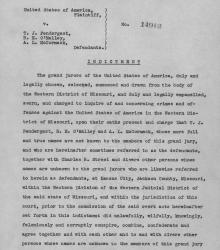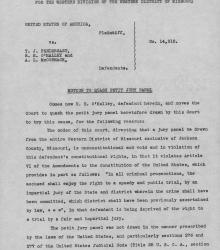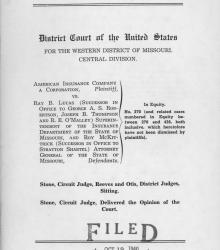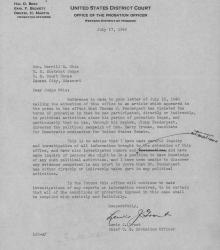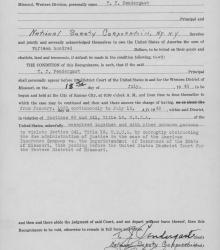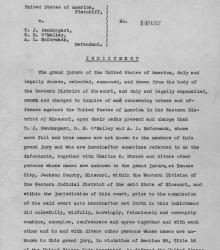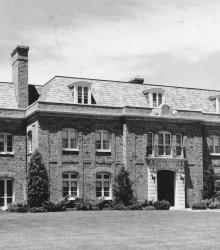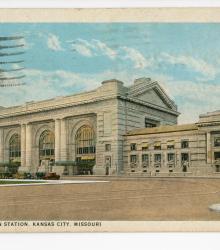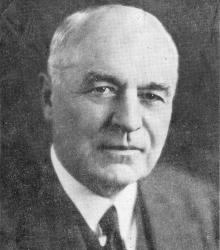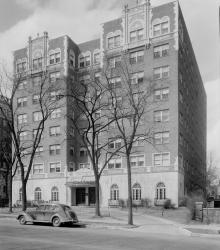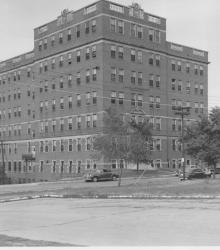Indictment for Criminal Case No. 14912: United States vs. Thomas J. Pendergast, Robert Emmet O'Malley, and A. L. McCormack, Defendant. In this indictment, the defendants are charged with the illegal appropriation of $8,000,000.00 collected from the American Insurance Company and other insurance companies.
Pendergast, Thomas J.
Motion of defendant R. E. O'Malley to quash petit jury panel for Criminal Case No. 14912: United States vs. Thomas J. Pendergast, Robert Emmet O'Malley, and A. L. McCormack, Defendant.
Excerpt of an unabridged print of American Insurance Company, Plaintiff, vs. Ray B. Lucas, Superintendent of the Insurance Department of the State of Missouri, and Roy McKittrick, Attorney General of the State of Missouri, Defendants.
Letter from Chief U.S. Probation Officer Lewis J. Grout to Judge Merrill E. Otis concerning Criminal Case No. 14458: United States vs. Thomas J. Pendergast, Defendant. In this letter, Grout affirms that despite newspaper reports, T. J. Pendergast has not participated in political activities since his release from prison.
Two Recognizances for appearance in court for Criminal Case No. 14912: United States vs. Thomas J. Pendergast, Robert Emmet O'Malley, and A. L. McCormack, Defendant. In these documents, Thomas J.
Indictment for Criminal Case No. 14937: United States vs. Thomas J. Pendergast, Robert Emmet O'Malley, and A. L. McCormack, Defendant. In this indictment, the defendants are charged with the illegal appropriation of $8,000,000.00 collected from the American Insurance Company and other insurance companies.
Home of Jackson County Democratic Party boss, Thomas J. Pendergast, at 5650 Ward Parkway, built by the J. C. Nichols Company. This vantage point faces west on Ward Parkway, just north of 57th Street.
On June 17, 1933, four law enforcement officers and their prisoner, Frank Nash, were fatally wounded in a botched rescue attempt outside Union Station. The story of the Union Station Massacre, as it became known, centered on Frank Nash, who had been convicted of three separate crimes of a serious nature: murder, armed burglary, and then assault.
One of Kansas City's most sensational and ultimately tragic crimes began on May 27, 1933 with the kidnapping of Mary McElroy, the daughter of controversial city manager Henry F. McElroy, who had close ties to the political machine operated by “Boss” Tom Pendergast. She was released after 34 hours of captivity, following payment of a $30,000 ransom, but she never recovered from the emotional turmoil that ensued.
Joseph “Joe” Shannon presided over Kansas City’s Northside Democratic Party from the early 20th century to 1930, after which he relocated to Washington, D.C., for a 14-year tenure as a U.S. Congressman. Shannon’s political career was marked by his Jeffersonian Democratic views and his tenuous relationships with brothers James and Tom Pendergast.
Johnny Lazia (born Lazzio) gained prominence in Kansas City’s politics during the 1920s and ‘30s due to his leadership of the North Side Democratic Club, engagement in local organized crime, and involvement with Tom Pendergast’s political machine. Pendergast dominated Kansas City politics not by holding elected offices, but through his machine of alliances and affiliates.
"They did not try to build something ‘good enough for Negroes’ but something as good as money could buy." This is how Chester Arthur Franklin, the Republican founder of The Call newspaper and one of Kansas City’s most prominent black leaders, greeted the newly constructed eight-story building that housed General Hospital No. 2, serving the indigent African American population of Kansas City.
